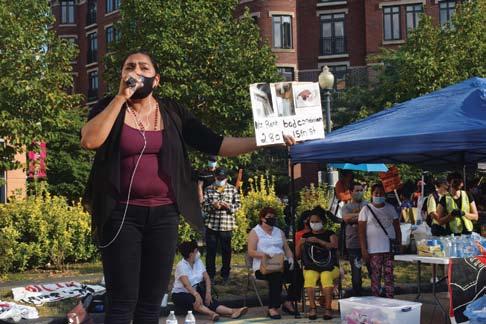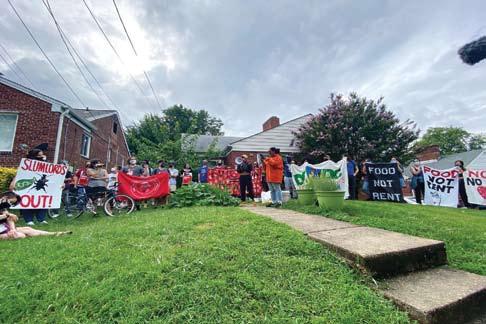
6 minute read
NEWS
Everything Is Rent
As evictions begin in neighboring jurisdictions, tenants insist payments plans won’t cut it.
Advertisement
By Amanda Michelle Gomez
@AmanduhGomez Sifu and M Lovell asked people who showed up at their brick house in Prince George’s County for an eviction blockade on the evening of July 31 to stay overnight if they could. Their landlord, Robert Miley, had threatened to come by and change the locks to their house, they said, but didn’t when he arrived and found dozens of people outside the house shouting things like, “Shame on who? Shame on Bob.” Sifu and Lovell wanted reinforcement if Miley returned.
And reinforcement they got. More than 50 people from across the region traveled to Chillum after learning about the possible illegal eviction online or by word of mouth, and a handful of those people, who were trained in de-escalation tactics, camped out in the house’s front yard through the next morning. A mix of people, diverse in age, gender, and race, occupied the dead-end street for hours.
In between chants, individuals took turns using a megaphone to lament not the coronavirus, but racism and capitalism, drivers of evictions and displacement before the global pandemic and now. A few shared their own experiences with eviction. One speaker, Roger Williams, is on the board of the DC Tenants Union and has been on a rent strike since May because many residents in his Columbia Heights apartment building have been laid off during the pandemic and cannot afford to pay rent.
“It’s not about one group of people feeling bad for another class of people. It’s solidarity,” said James McCormack, another board member of the DC Tenants Union, as he sat on the curb. McCormack, too, was laid off during the pandemic.
The DC Tenants Union and Stomp Out Slumlords, a campaign of the Metro D.C. chapter of the Democratic Socialists of America, organized the eviction blockade. Volunteers have been organizing protests like these throughout the public health emergency because so many tenants have fallen on hard times and are behind on rent. Hundreds of thousands of people across the D.C. region have lost their jobs and filed for
Photos by Amanda Michelle Gomez
Estela holds a sign with photos of her apartment at a rally on canceling rent on July 25.

Sifu and M Lovell thank everyone who showed up at their house for an eviction blockade on July 31. unemployment, and hundreds, if not thouMaryland law, for example, requires landlords sands, cannot access those benefits because to give tenants at least one month’s notice before they do not qualify or get caught up in bureaurepossessing the property—Governor Larry cratic red tape. Meanwhile, rent has been due Hogan barred the eviction of those financially five times. impacted by the pandemic until the state of
Sifu, who declined to give her last name, lost emergency ends. However, the Maryland District her job at an after-school program during the Court did not extend its eviction ban, so hearings pandemic. When she and her two other roomwere technically able to resume as of July 25. mates had trouble paying back four months Eviction moratoriums have been lawmakworth of rent in full, along with late fees, Miley ers’ most effective way of providing tenants sent an email on July 19 and told them they had immediate relief. The relief is temporary, and 10 days to vacate. the threat of displacement or homelessness
“I have scheduled a major remodeling looms. The federal moratorium on evictions project for the property which will begin on expired July 24, and courts in several states, Saturday, August 1,” read screenshots of an including Virginia, have already started hearemail sent by the landlord and shared with ing eviction cases. D.C.’s eviction moratorium City Paper. “I plan to meet you at the property is tethered to the public health emergency, and to pick up keys at 5:00 pm on 7/31/20 and to Council Chairman Phil Mendelson wants to ensure that all your personal property has been re-examine COVID-19 legislation and possibly removed.” decouple provisions. (No decisions have been
Miley did not respond to City Paper’s request made yet, according to the chairman’s office.) for comment. The inevitability of mass evictions once mor
Beyond standard tenant protections— atoriums end is why tenant organizers have been calling for rent cancelation. As is clear with the Chillum house, some landlords are ready to evict.
“We wouldn’t have picked this if we thought something less would solve the problem,” says McCormack. “The problem is the scale of the crisis is so massive.”
The DC Tenants Union has been demanding the D.C. Council cancel rent citywide, and has organized in more than a dozen residential buildings to get individual landlords to agree to such relief. No landlord to date has agreed to fully forgive rent. The D.C. Council, along with Maryland and Virginia legislatures, has so far declined to seriously consider rent cancelation, arguing landlords need to pay their mortgages too.
Lawmakers have been more interested in giving people money to pay rent. “What’s really happening,” McCormack argues, “is people are having to go through an onerous application process that is time-consuming, complicated, and humiliating in order to serve as a middle man between the government and their landlord.”
The Council also passed legislation requiring landlords to offer a payment plan to any residential or commercial tenant who can’t pay all or a portion of rent due to the pandemic. It’s not clear how many tenants, if any, are entering into payment plan agreements. City Paper’s attempts to find a residential tenant who has came up short.
“We are not hearing about people entering into or finalizing any payment plans at this point,” says Leigh Higgins, an attorney for the D.C. Tenants’ Rights Center, a private law firm that hears from tenants all across the income spectrum. Neither has Beth Mellen Harrison with Legal Aid of the District of Columbia.
Harrison has heard from tenants whose landlords got in touch with them about a payment plan and questioned whether they were ready to enter into an agreement. She’s also heard of some instances where landlords are creating agreements that she believes are inconsistent with the local law. For example, one landlord asked a tenant to submit proof of all assets, presumably to see if they have any money saved to pay rent.
“The idea of a payment plan is nice in theory, but they don’t have the money right now, or know when they will have the money, to pay back the rent. And so it’s not something that at this moment in time feels particularly useful to them,” says Harrison. “I don’t think that necessarily means this law will not be helpful at some point. But I don’t think we’re at the point yet where the free fall has ended and there’s stability.”
Luis Andrade is weighing whether to enter into a payment plan agreement with his landlord. His options are paying a portion of his rent or feeding his 3-year-old daughter.
Andrade has not paid rent since April, after losing his two sources of income as a restaurant worker and day laborer. He now owes $5,080 in rent. He does not qualify for unemployment benefits and was certain







